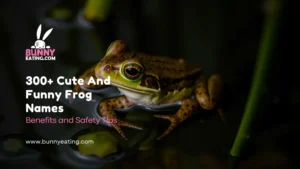For your pet rabbit’s well-being and health, you have to decide what diet is perfect for it. You may have faced aloe vera when looking into various food choices and wondered if rabbits could safely eat it. We’ll look at the risks of providing aloe vera to rabbits in this accurate guide, as well as secure alternatives and helpful suggestions for setting up a rabbit-friendly habitat. You can ensure the happiness and endurance of your rabbit by being aware of the possible risks associated with aloe vera as well as discovering how to provide for their dietary requirements. Come along as we explore the nuances of rabbit nutrition and learn the best ways to maintain the well-being and health of your furry friend. Can Rabbits Eat Aloe Vera?
Safe Alternative to Rabbit Eating Aloe Vera
Rabbits are inclined to nibble on a variety of plants, but it is essential to make sure they eat healthy and secure foods. Because of the risks concerned, aloe vera might not be the best option. Rather, think about alternatives like veggies (carrots, bell peppers), greens that are leafy (kale, romaine lettuce), and local herbs (parsley, cilantro). These replacements offer vital nutrients without the risks of aloe vera.
Risks of Feeding Aloe Vera to Rabbits
Aloe vera contains compounds like aloin and anthraquinones, which can be harmful to rabbits. These substances may cause digestive upset, diarrhoea, and even toxicity in large amounts. Additionally, aloe vera latex can irritate the gastrointestinal tract, leading to discomfort and potential health issues for rabbits.

Effects of Aloe Vera on Rabbits
If rabbits ingest aloe vera, they may experience digestive problems such as diarrhoea, abdominal pain, and dehydration. In severe cases, aloe vera consumption can lead to toxicity, which may manifest as more severe symptoms like tremors, lethargy, and loss of appetite. Monitoring rabbits closely for any adverse effects is essential if they accidentally consume aloe vera.
Are Aloe Vera Good for Rabbits?
No, aloe vera is not suitable for rabbits due to its potential toxicity and digestive irritant properties. While aloe vera may have health benefits for humans, it poses risks to rabbits and should be avoided as a dietary option for them.
Nutritional Value of Aloe Vera for Rabbits
Aloe vera contains various vitamins, minerals, and antioxidants, which can be beneficial for humans. However, rabbits have different nutritional requirements, and aloe vera does not provide essential nutrients tailored to their needs. Therefore, it’s not a suitable food source for rabbits.
How is Aloe Vera Made?
Aloe vera is a succulent plant cultivated for its medicinal and cosmetic properties. The gel inside the aloe vera leaves is extracted and processed to create various products like gels, juices, and supplements. Commercial aloe vera products undergo filtration and purification processes to ensure safety and efficacy.

What Types of Aloe Vera Are Safe for Rabbits?
There are various species of aloe vera, but none are considered safe for rabbit consumption. Regardless of the type, aloe vera plants contain compounds that can be harmful to rabbits and should be avoided in their diet.
Do Wild Rabbits Eat Aloe Vera?
Wild rabbits typically avoid aloe vera due to its bitter taste and potential toxicity. They instinctively select safe and nutritious plants for foraging, preferring grasses, herbs, and leafy greens over potentially harmful species like aloe vera.
Why Are Aloe Vera Harmful to Rabbits?
Aloe vera contains compounds like aloin and anthraquinones, which can irritate the gastrointestinal tract and cause digestive upset in rabbits. Additionally, aloe vera latex can have laxative effects and may lead to dehydration and electrolyte imbalances in rabbits.
Store-bought Aloe Vera and Rabbits
Commercial aloe vera products like gels and juices are not suitable for rabbit consumption. These products may contain additives, preservatives, or concentrations of aloe vera that can be harmful to rabbits. It’s best to avoid feeding any form of aloe vera to rabbits.

How Often Can My Rabbit Eat Aloe Vera?
Rabbits should not consume aloe vera at any frequency. Due to its potential toxicity and digestive irritant properties, aloe vera is not a suitable food for rabbits and should be completely avoided in their diet. Regular consumption of aloe vera can lead to digestive upset, diarrhoea, and other health issues in rabbits.
How Many Aloe Vera Varieties Are There?
There are over 400 species of aloe plants, but not all of them are used for medicinal or dietary purposes. Aloe vera, also known as Aloe miller, is one of the most commonly cultivated species for its gel, which is used in various skincare and health products. While there are many aloe species, none are safe for rabbit consumption.
How Healthy Are Aloe Vera Plants?
Aloe vera plants have been traditionally used for their medicinal properties in humans, particularly for skin conditions and minor wounds. However, when it comes to rabbits, aloe vera is not considered healthy. The compounds found in aloe vera can be harmful to rabbits and may cause digestive issues and toxicity if ingested.
Nutritional Value of Aloe Vera
Aloe vera contains vitamins, minerals, and antioxidants that are beneficial for humans, including vitamins A, C, and E, as well as calcium, magnesium, and potassium. However, rabbits have different nutritional requirements than humans, and aloe vera does not provide the essential nutrients rabbits need for their health. Therefore, it’s not a suitable food for them.

Preparing Aloe Vera for Rabbits
It’s crucial to avoid preparing aloe vera for rabbits altogether. No amount of preparation can make aloe vera safe for rabbit consumption. Due to its potential toxicity and digestive irritant properties, aloe vera should not be included in a rabbit’s diet in any form.
What Should I Combine Aloe Vera with for My Rabbit?
Instead of combining aloe vera with other foods for your rabbit, focus on providing a well-balanced diet consisting of hay, fresh vegetables, and limited amounts of pellets. These foods meet the nutritional needs of rabbits and promote digestive health without the risks associated with aloe vera.
What If My Rabbit Eats a Large Amount of Aloe Vera?
If your rabbit consumes a large amount of aloe vera, monitor them closely for signs of toxicity or digestive upset. Contact your veterinarian immediately for guidance on how to proceed. They may recommend supportive care or treatment depending on the severity of the situation.
When Shouldn’t You Feed Aloe Vera to Your Rabbit?
You should never feed aloe vera to your rabbit under any circumstances. Regardless of the situation, aloe vera is not a safe or suitable food for rabbits and can pose serious health risks if ingested.

Monitoring Your Rabbit’s Health
Regularly monitor your rabbit’s health for any signs of illness or discomfort, especially if they have access to plants or other potential hazards. If you notice any changes in your rabbit’s behaviour, appetite, or stool consistency, consult your veterinarian promptly.
What Actions Should I Take If My Rabbit Consumes Aloe Vera?
If you suspect your rabbit has consumed aloe vera, contact your veterinarian immediately for guidance. Provide them with details about the amount ingested and any observed symptoms. Your veterinarian will assess the situation and may recommend monitoring your rabbit closely for signs of toxicity or digestive upset. In severe cases, they may advise bringing your rabbit in for examination and treatment.
What Else Can I Feed My Rabbit?
In addition to hay, fresh vegetables, and limited pellets, you can offer your rabbit small amounts of fruits as occasional treats. Safe fruits for rabbits include apples (without seeds), bananas, strawberries, and blueberries. Remember to introduce new foods gradually and monitor your rabbit for any adverse reactions.
How to Create a Rabbit-Friendly Garden?
To create a rabbit-friendly garden, choose a variety of safe plants for rabbits to nibble on, such as grasses, herbs, and leafy greens. Avoid planting toxic plants like aloe vera, lilies, and daffodils. Provide hiding spots and enrichment items like tunnels and wooden toys to stimulate your rabbit’s natural behaviours.

Rabbit Treats Made at Home
You can make homemade rabbit treats using rabbit-safe ingredients like oats, mashed banana, and finely chopped vegetables. Mix the ingredients into small balls or shapes and bake them at a low temperature until they’re firm. Let the treats cool completely before offering them to your rabbit as occasional rewards for good behaviour.
Conclusion
In summary, aloe vera may be helpful for humans, but given its possibility of toxicity and ability to irritate the GI tract, it poses serious hazards to rabbits. You may boost your rabbit’s health and well-being by cutting aloe vera from their diet while providing them nutritious alternatives like veggies, dark greens, and fresh herbs. To make sure your rabbit has an enjoyable and fulfilling existence, you must create an environment that is rabbit-friendly and provides a balanced diet and stimulating pastimes. You and your furry friend can have many happy years collectively if you put their diets and safety initially.
FAQs
-
Can rabbits eat aloe vera?
No, rabbits should not eat aloe vera. Aloe vera contains compounds that can be harmful to rabbits and may cause digestive issues and toxicity.
-
What are the risks of feeding aloe vera to rabbits?
Feeding aloe vera to rabbits can lead to digestive upset, diarrhoea, and potential toxicity due to the presence of compounds like aloin and anthraquinones.
-
Are there safe alternatives to aloe vera for rabbits?
Yes, there are plenty of safe alternatives for rabbits, including fresh herbs, leafy greens, and vegetables, which provide essential nutrients without the risks associated with aloe vera.
-
How can I create a rabbit-friendly environment?
You can create a rabbit-friendly environment by providing a balanced diet, enriching activities, and safe plants for nibbling. Avoid toxic plants like aloe vera and prioritize your rabbit’s health and well-being.
-
What should I do if my rabbit accidentally eats aloe vera?
If your rabbit consumes aloe vera, contact your veterinarian immediately for guidance. Monitor your rabbit for any signs of illness and follow your veterinarian’s recommendations for treatment.
-
Can wild rabbits eat aloe vera?
Wild rabbits typically avoid aloe vera due to its bitter taste and potential toxicity. They instinctively select safe plants for foraging, such as grasses and leafy greens.
-
How often can I feed aloe vera to my rabbit?
Aloe vera should never be fed to rabbits under any circumstances. It’s not a suitable food for them and can pose serious health risks if ingested regularly.
-
What else can I feed my rabbit besides aloe vera?
You can feed your rabbit a variety of safe foods, including hay, fresh vegetables, limited pellets, and occasional treats like fruits (e.g., apples, bananas) in small amounts.











